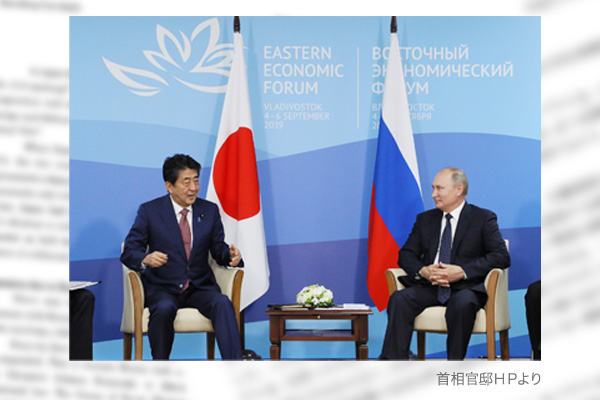Prime Minister Shinzo Abe’s 27th meeting with Russian President Vladimir Putin, which took place in Vladivostok on September 5, made no progress in Japan-Russia negotiations on a bilateral peace treaty and Japan’s territorial claim to the Russian-held Northern Territories, indicating that the negotiations have been deadlocked. Russia seems determined not to return even two of the four Northern Territories islands to Japan. Abe’s plan to win the return of the two has turned out to be his one-sided idea, as noted in editorials of the Asahi Shimbun and Sankei Shimbun newspapers. The prime minister is urgently required to review and revise his strategy on Russia.
Negotiations affected by changes in U.S.-China-Russia relations
At their meeting in Singapore last November, the Japanese and Russian leaders agreed to accelerate the peace treaty negotiations based on the 1956 Japan-Soviet joint communique that called for returning the two smaller islands – the Habomais and Shikotan – to Japan. As full negotiations started early this year, however, Russia toughened its stance. Prime Minister Abe’s conclusion that Japan could strike a deal by setting back from its long-standing demand for the return of the four islands to the two-island approach has turned out wrong.
The Sankei newspaper on September 3 reported that the Russian National Security Council in January 2019 decided to refrain from accelerating negotiations at Japan’s initiative and lead Japan to recognize that the four islands became Russian territories as a result of World War II. If this report is true, Russia made an official binding decision on a hardline attitude against Japan, as indicated by a series of uncompromising remarks by President Putin and Foreign Minister Sergey Lavrov.
Although a decline in the president’s approval ratings, nationalism and other Russian domestic factors can be cited as factors behind the decision, changes in U.S.-China-Russia trilateral relations in the past year may have exerted a greater impact on Russian diplomacy.
U.S.-Russia relations have become worse than under the Obama administration as Washington toughened sanctions on Russia and expanded defense spending to develop new weapons. Moscow has given greater priority to Beijing than to Washington, while Beijing has seen Russia increasingly useful as U.S.-China trade war gets protracted.
As the confrontation deepens between the U.S. on one side and Russia and China on the other, Russia has begun to view the Japan-U.S. alliance as a problem. As Japan’s significance for Russia has declined, the Northern Territories issue might have been buried into new developments in U.S.-China-Russia relations.
Failed METI-led diplomacy
Tokyo’s territorial negotiations with the Putin government can no longer be expected to make any progress. Prime Minister Abe’s pledge to “put an end to the territorial issue in cooperation with Vladimir” has been outdated. No Japanese people believe in the pledge. Rather, the prime minister should recognize that the presence of the Putin government has become an impediment to the territorial negotiations.
Now that the negotiations have bogged down, Prime Minister Abe should disclose some of the concealed details of his negotiations with Putin and explain why he switched to the two-island approach from the four-island one. The prime minister should also review the failure of a diplomacy led by the Ministry of Economy, Trade and Industry that has given priority to an eight-point aid initiative and other proposals for Japan-Russia economic cooperation rather than national sovereignty or national security.
As indicated by anti-Putin rallies led by young people in major cities every weekend, young Russian generations have a sense of stagnation under the prolonged Putin rule and been discontent with Russia’s international isolation. Japan should rebuild its long-term strategy on Russia toward a post-Putin age.
Kenro Nagoshi is a professor at the Institute of World Studies, Takushoku University, and a former foreign news editor and bureau chief in Moscow, Washington, D.C. and Bangkok for the Jiji Press. He is also a Planning Committee member at the Japan Institute for National Fundamentals.


